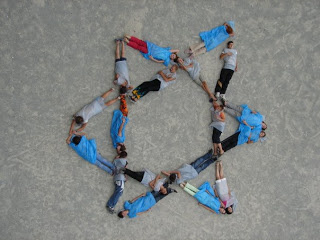Rabbi Donniel Hartman, President of Shalom Hartman Institute and Director of it’s Engaging Israel Project, blogs wisely about the essence of Judaism. We are a people first; religious faith and tradition secondarily. We learn this on Pesach, which he calls the “Independence Day of the Jewish People.”
…this [peoplehood] identity precedes our religious faith: [just as] Pesach precedes Shavuot. In a Jewish world where all too often one’s particular denomination or religious practice serves as a wall between oneself and fellow Jews, where the central question is often in whose house one does not eat, or in which synagogue one does not pray, the ethos of Pesach calls out and reminds one that Jewish peoplehood comes first. While Judaism does not stop with peoplehood and Sinai is a defining moment shaping the values and content of our national identity, the place of Pesach in our calendar [coming before Shavuot, the holiday celebrating the giving of Torah], I believe, gives it primacy. By this I mean that our Jewish values and practices must not only shape our collective identity but must be shaped by them.
Ours is a world where Conservative Jews belittle the religious sensibilities of Reform Jews, where Reform Jews deny the value of Orthodox Jews practices, where Orthodox reject the halakhic (Jewish legal) outlook of Conservative Jews (and don’t forget the Reconstructionist, Haredi, Renewal, Transdenominational and other Jews). In Israel, the divisions are deeper as they are tied into national politics – from marriage and burial, to the role of women, to the future of the West Bank settlements.
Rabbi Hartman continues:
Religion by its nature creates a God intoxication in which we strive to walk in the way of God, regardless of the consequences to ourselves and to others. The “heroic figure” of Abraham in Genesis 22 [the Akedah, Abraham’s almost sacrifice of Isaac] models such a religious pathos.
Pesach, I believe, requires of us a peoplehood intoxication, a commitment not only to loyalty and love of the Jewish people but also to filter our individual religious commitments through the prism of what will serve our people as a whole. In the Ethics of our Fathers, according to Rabbi Nathan, Chapter 2, we are taught that Moses broke the Tablets of the Ten Commandments without Divine approval, because he was fearful that giving the Torah to the Jewish people at that time would condemn them as idolatrous sinners and consequently warrant their destruction.
Declarations of Jewish unity will not suffice. Like Moses we have to ask ourselves: Which part of Torah we are willing to relinquish for the sake of the Jewish people, which truth or personal commitment, while dear to us, is too dear, and causes hurt and alienation? When doing so it is not a religious compromise but rather a religious value, a fulfillment of the dictates of our tradition which celebrates Pesach first and makes it the foundation of Sinai and not the opposite.
Rabbi Hartman’s wisdom rings true. Peoplehood, not lip serviced declarations, but real commitment to Jewish peoplehood might shine a way forward in the Jewish religious battles in Israel. May this reaffirmation of the primacy of Jewish peoplehood strengthen us as our brothers and sisters in Israel struggle to redefine the role of religion in public life, and we in America struggle to deepen our connections despite divergent opinions about Jewish living and Israeli politics.

